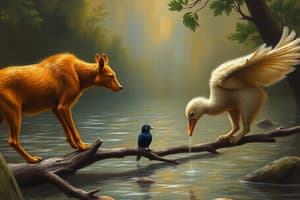Podcast
Questions and Answers
What branch of biology studies animals and their behavior, physiology, and classification?
What branch of biology studies animals and their behavior, physiology, and classification?
- Zoology (correct)
- Botany
- Entomology
- Ecology
Which sub-discipline of zoology investigates the behavior of animals in natural environments?
Which sub-discipline of zoology investigates the behavior of animals in natural environments?
- Evolutionary Biology
- Animal Behavior (Ethology) (correct)
- Ecology
- Taxonomy
What is the main focus of conservation biology?
What is the main focus of conservation biology?
- Protecting and managing biodiversity (correct)
- Classifying animal species
- Analyzing animal behavior
- Studying animal evolution
Which animal group is characterized by lacking a backbone?
Which animal group is characterized by lacking a backbone?
What does biodiversity refer to?
What does biodiversity refer to?
Which sub-discipline studies the physiological processes in animal bodies?
Which sub-discipline studies the physiological processes in animal bodies?
What technique is primarily used for observing animals in their natural habitats?
What technique is primarily used for observing animals in their natural habitats?
Which of the following is an example of a zoonotic disease?
Which of the following is an example of a zoonotic disease?
Flashcards are hidden until you start studying
Study Notes
Overview of Zoology
- Zoology is the branch of biology that studies animals, their behavior, physiology, classification, and distribution.
- It encompasses various sub-disciplines, including ecology, physiology, genetics, evolution, and taxonomy.
Sub-disciplines of Zoology
-
Animal Physiology
- Studies the functions and mechanisms in animal bodies.
- Explores processes such as respiration, digestion, and circulation.
-
Animal Behavior (Ethology)
- Investigates the behavior of animals in their natural environments.
- Examines mating rituals, foraging, and social interactions.
-
Taxonomy
- The science of classifying and naming animals.
- Uses hierarchical classification (Domain, Kingdom, Phylum, Class, Order, Family, Genus, Species).
-
Ecology
- Studies the relationships between animals and their environments.
- Focuses on ecosystems, habitats, and the impact of human activity.
-
Evolutionary Biology
- Explores the origin and diversification of animal species.
- Investigates natural selection, adaptation, and speciation.
Major Animal Groups
-
Invertebrates
- Lack a backbone; include insects, arachnids, mollusks, and cnidarians.
- Make up approximately 95% of animal species.
-
Vertebrates
- Possess a backbone; include fish, amphibians, reptiles, birds, and mammals.
- Typically characterized by more complex body structures.
Important Concepts
-
Biodiversity
- Refers to the variety of life in a particular habitat or ecosystem.
- Important for ecosystem stability and resilience.
-
Conservation Biology
- Focuses on protecting and managing biodiversity.
- Addresses issues like habitat loss, pollution, and climate change.
-
Zoonotic Diseases
- Diseases that can be transmitted from animals to humans (e.g., rabies, avian flu).
- Understanding animal biology is crucial for preventing outbreaks.
Tools and Techniques
-
Field Studies
- Involves observing animals in their natural habitats.
- Used to gather data on behavior, population dynamics, and interactions.
-
Laboratory Research
- Involves controlled experiments to study physiological and genetic processes.
- Allows for in-depth analysis of specific animal functions.
-
Molecular Techniques
- Include genetic sequencing and bioinformatics for studying evolutionary relationships.
- Enhance understanding of genetic diversity and species identification.
Career Paths in Zoology
- Wildlife biologist
- Conservation officer
- Zoo curator
- Research scientist
- Environmental educator
Importance of Zoology
- Enhances understanding of animal life and ecosystems.
- Contributes to conservation efforts and biodiversity protection.
- Provides insights into animal health and human-animal interactions.
Overview of Zoology
- Zoology focuses on the study of animals, including their behavior, physiology, classification, and distribution.
- Incorporates various sub-disciplines such as ecology, physiology, genetics, evolution, and taxonomy.
Sub-disciplines of Zoology
- Animal Physiology: Investigates functions and mechanisms in animal bodies including respiration, digestion, and circulation.
- Animal Behavior (Ethology): Studies behavior in natural settings, analyzing aspects like mating rituals, foraging, and social bonds.
- Taxonomy: Classifies and names animals according to a hierarchical system: Domain, Kingdom, Phylum, Class, Order, Family, Genus, Species.
- Ecology: Examines interactions between animals and their environments, focusing on ecosystems, habitats, and human impacts.
- Evolutionary Biology: Explores origins and diversification of species through natural selection, adaptation, and speciation processes.
Major Animal Groups
- Invertebrates: Comprise around 95% of animal species; include insects, arachnids, mollusks, and cnidarians; characterized by the absence of a backbone.
- Vertebrates: Include fish, amphibians, reptiles, birds, and mammals; recognized for having a backbone and generally more complex body structures.
Important Concepts
- Biodiversity: Refers to the variety of life within an ecosystem; essential for ecosystem resilience and stability.
- Conservation Biology: Aims at protecting and managing biodiversity; tackles challenges such as habitat loss, pollution, and climate change.
- Zoonotic Diseases: Diseases transferable from animals to humans, such as rabies and avian flu; highlights the need for understanding animal biology to prevent outbreaks.
Tools and Techniques
- Field Studies: Observations in natural habitats to collect data on animal behavior and interactions, aiding in population dynamics analysis.
- Laboratory Research: Controlled experiments to study physiological and genetic functions, allowing for detailed examinations of animal processes.
- Molecular Techniques: Techniques like genetic sequencing and bioinformatics that investigate evolutionary relationships, enhancing species identification and genetic understanding.
Career Paths in Zoology
- Opportunities include wildlife biologists, conservation officers, zoo curators, research scientists, and environmental educators.
Importance of Zoology
- Enhances comprehension of animal species and ecosystems.
- Plays a critical role in conservation initiatives and the protection of biodiversity.
- Offers insights into health issues and interactions between humans and animals.
Studying That Suits You
Use AI to generate personalized quizzes and flashcards to suit your learning preferences.




